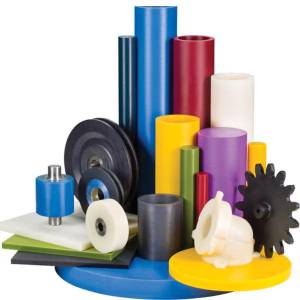Description
Cast Nylon: High-Performance Engineering Plastic
Cast nylon, also known as polyamide (PA), is a high-performance thermoplastic offering a unique combination of properties that make it ideal for a wide range of demanding applications. Unlike injection-molded nylon, cast nylon undergoes a unique manufacturing process that results in superior mechanical properties and dimensional stability.
Key Features & Benefits:
- Exceptional Mechanical Strength: Cast nylon boasts high tensile, compressive, and flexural strength, making it exceptionally durable and resistant to wear and tear. This allows for the creation of parts capable of withstanding significant loads and stresses.
- Excellent Abrasion Resistance: Its smooth surface and inherent toughness provide superior resistance to abrasion, friction, and wear, resulting in extended component lifespan, particularly in applications involving sliding or rubbing contact.
- High Impact Resistance: Cast nylon can withstand significant impacts without fracturing or breaking, making it suitable for applications where shock absorption is critical.
- Good Chemical Resistance: While not universally resistant to all chemicals, cast nylon offers good resistance to many common solvents, oils, fuels, and dilute acids and alkalis. Specific chemical compatibility should be verified based on the intended application.
- Low Moisture Absorption: Compared to other polymers, cast nylon exhibits relatively low moisture absorption, minimizing the potential for dimensional instability and ensuring consistent performance over time.
- Self-Lubricating Properties: Cast nylon possesses inherent self-lubricating properties, reducing friction and wear, particularly beneficial in moving parts and bearings.
- Excellent Electrical Insulation: Cast nylon offers good electrical insulation properties, making it suitable for electrical and electronic components.
- Superior Dimensional Stability: The casting process leads to improved dimensional stability compared to injection-molded nylon, resulting in tighter tolerances and greater precision.
- Design Flexibility: Cast nylon can be manufactured in a wide range of shapes and sizes, offering design flexibility and the ability to create complex geometries.
Applications:
Cast nylon's unique properties make it suitable for a diverse range of applications, including:
- Machinery Components: Gears, bushings, bearings, sprockets, and other components requiring high strength and wear resistance.
- Automotive Parts: Seals, bushings, and other components exposed to harsh environments.
- Electrical Components: Insulators, spacers, and other electrical components requiring high dielectric strength.
- Chemical Processing Equipment: Components in contact with chemicals and solvents (check chemical compatibility).
- Food Processing Equipment: Parts requiring high hygiene standards and resistance to cleaning agents.
- Medical Devices: Components requiring biocompatibility (specific grades may be required).
Material Grades & Specifications:
Various grades of cast nylon are available, each offering specific properties optimized for different applications. These variations may include different levels of reinforcement (e.g., glass-filled nylon), modifications for improved impact resistance or chemical resistance, and different color options. Specific material specifications should be determined based on the application requirements.
Limitations:
While highly versatile, cast nylon does have some limitations:
- Creep: Under sustained load, cast nylon can exhibit some creep (slow deformation).
- Temperature Sensitivity: The operating temperature range of cast nylon is generally limited. High temperatures can lead to reduced strength and dimensional changes.
- UV Degradation: Prolonged exposure to ultraviolet (UV) radiation can degrade the material.
Conclusion:
Cast nylon offers a compelling combination of strength, durability, and chemical resistance, making it a highly sought-after engineering plastic for demanding applications across numerous industries. Its superior properties compared to injection-molded nylon often justify the slightly higher cost for applications requiring enhanced performance and reliability. Consult with a materials specialist to select the optimal grade of cast nylon for your specific needs.
